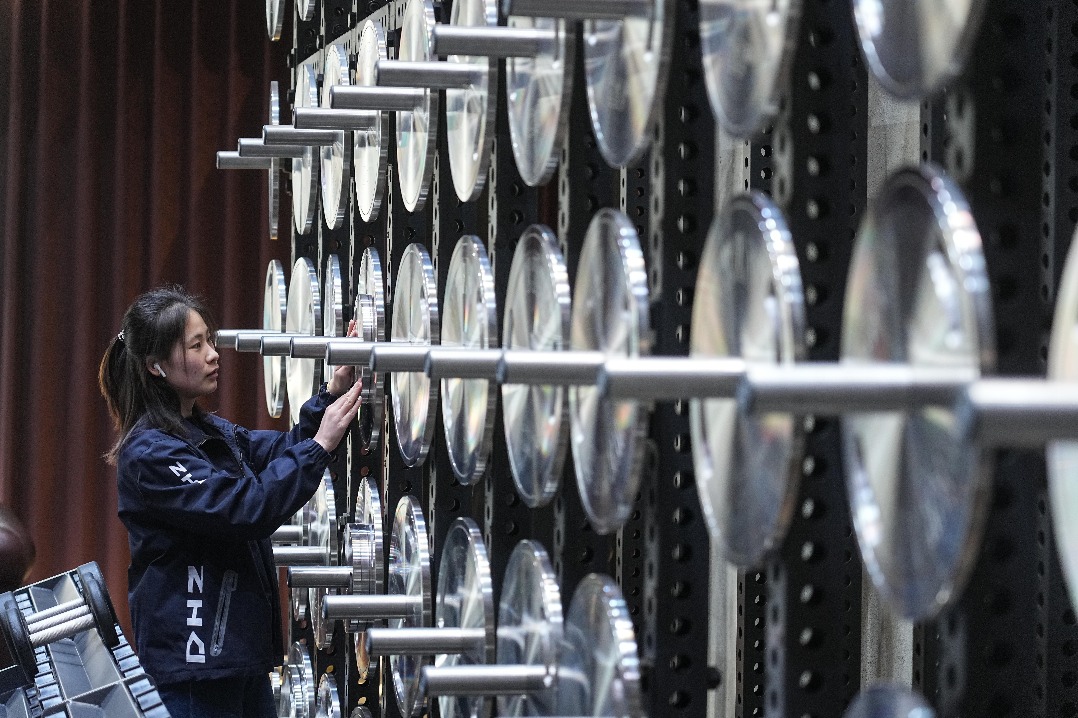Factory activity stays in expansion zone


Manufacturing still on healthy track despite rising costs and falling exports
China's factory activity remained in expansionary territory for the ninth consecutive month in January, although the expansion was at the slowest pace in seven months due to falling export orders, new pandemic cases and rising costs, a private survey said on Monday.
The Caixin China General Manufacturing Purchasing Managers' Index fell by 1.5 percentage points on a monthly basis to 51.5 in January, the lowest level since July. The trend is consistent with the manufacturing PMI released by the National Bureau of Statistics on Sunday. The official figure was 51.3 in January, down 0.6 percentage point on a monthly basis. The official nonmanufacturing PMI fell by 3.3 percentage points on a monthly basis to 52.4 in January, but it has remained above the 50 mark that separates expansion from contraction for 11 consecutive months, according to the NBS.
The PMI decline reflects a weakening of the sequential growth momentum due to new COVID-19 cases and stricter government virus control measures, which include stricter social distancing rules, the reimposition of lockdown measures and travel bans in some parts of China, and nationwide initiatives to encourage migrant workers to stay in the cities of their workplaces for the upcoming Lunar New Year holiday, said Lu Ting, chief China economist at Nomura Securities, a Japanese brokerage, in a research note.
"However, the decline in the PMI actually appears somewhat moderate, in our view, once we take into account the much stricter social distancing rules introduced by local governments across China, as these new restrictions may be having a limited impact on manufacturing, and as people may have already largely adjusted their consumption patterns over the past year.
"Considering the government's swift responses, efficient virus testing and population tracing systems and the ongoing vaccine rollout, the COVID-19 situation could be brought under control relatively soon," Lu said.
Wen Bin, chief analyst at China Minsheng Banking Corp, said: "The Chinese economy still maintained its recovery momentum despite the small PMI decline in January, which was partly due to seasonal factors.
"To prevent the spread of COVID-19, local authorities are discouraging workers from going back to hometowns for celebrating the Lunar New Year holiday. This will largely reduce the negative effects of labor shortage on production before and after the holiday, so that the production and supply will maintain a steady recovery."
It is true that recent scattered cases of the disease will lead to a decrease in consumption. Moreover, the transportation, hotel and tourism industries will be affected, as China urges workers to avoid holiday travel, but it does not mean consumer demand will disappear. Instead, during the holiday, consumer demand will increase in the cities of their workplaces, Wen said.
"Considering that the external environment is still uncertain and the foundation for domestic economic recovery is not solid enough, China should maintain a continuous and stable macroeconomic policy so that the growth in supply and demand will remain steady," he said.
Looking ahead, he said China must focus on expanding domestic demand. In the short run, the government should launch policies to incentivize consumption of automobiles and home appliances and boost growth in new types of consumption.
In the long run, the country should focus on income distribution reforms, promote long-term apartment rentals in first-tier cities, improve endowments, health and unemployment insurances, and promote urbanization to unlock consumption potential for migrant workers after they become urban residents.
Wang Zhe, senior economist at Caixin Insight Group, said the overall manufacturing sector is still in the process of recovering from the COVID-19 pandemic but was affected by weakening momentum of supply and demand and dragged down by sluggish overseas demands.





































